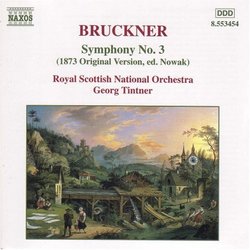| All Artists: Anton Bruckner, Georg Tintner, Royal Scottish National Orchestra Title: Bruckner: Symphony No. 3 (1873 Original Version, ed. Nowak) Members Wishing: 0 Total Copies: 0 Label: Naxos Release Date: 2/22/2000 Genre: Classical Style: Symphonies Number of Discs: 1 SwapaCD Credits: 1 UPC: 730099445429 |
Search - Anton Bruckner, Georg Tintner, Royal Scottish National Orchestra :: Bruckner: Symphony No. 3 (1873 Original Version, ed. Nowak)
 | Anton Bruckner, Georg Tintner, Royal Scottish National Orchestra Bruckner: Symphony No. 3 (1873 Original Version, ed. Nowak) Genre: Classical
|
Larger Image |
CD Details |
CD ReviewsBruckner's Wagner Symphony Revived Thomas F. Bertonneau | Oswego, NY United States | 10/07/2000 (5 out of 5 stars) "Anton Bruckner's most popular symphonies are no doubt numbers Four and Seven; most aficionados of the nineteenth century symphonic repertoire also are familiar with and feel fondness for numbers Six, Eight, and Nine. The Fifth is more daunting, but it is frequently recorded and has become something a test for daring interpreters. The remaining six symphonies - the oddly designated Symphonies Nos. "00" and "0," along with Nos. 1 through 3 - remain much less visited by conductors and constitute terra incognita for most listeners. Commentators sometimes remark that these scores do not reveal the mature Bruckner, who appears only with the Fourth. This is a pity, since even the "Doppelnullte" ("00") has much to offer. Georg Tintner, who died last year after completing the first fully integral recorded edition of Bruckner's cycle (for Naxos), understood this. Tintner's "take" of the Third Symphony makes a powerful case for regarding this work as, indeed, Bruckner in the major phase of his creativity. Tintner also respects the composer's initial version of the score, from which he later (on well meant but misguided advice from friends) excised hundred of bars. In restituting the excisions, Tintner restores the many Wagner quotations that not only ornament Bruckner's symphonic argument, but generate motifs and themes as well. Sir Roger Norrington also recorded the original version of the Third. His First Movement requires 18 minutes; Tintner's needs 30 minutes. For the Finale, Norrington requires 15 minutes, Tintner 20 minutes. The difference stems from Tintner's slow tempi; but this does not mean a limp or annoyingly undramatic persusal of the music. On the contrary, Tintner always manages to keep the tension up. He makes Norrington seem rushed. This CD is a first-rate installment in a first-rate Bruckner cycle." Pure Brucknerian glory cmk | Oregon | 06/08/2001 (5 out of 5 stars) "This is a magnificent and very expansive performance of the original 1873 score of Bruckner's 3rd symphony. When I first got this symphony, I could not figure it out right at first. After about 5 listens, it make sense and I liked it. After a few more, I loved it. After a few more, I was crazy about it. In this piece you hear something new every time you hear it. It greatly improves with repeated listening.(I was also a very young Brucknerian, I was just beginning my collection. That's actually probably the main reason.) If you don't figure it out right at first, don't let that discourage you. You could start out with a shorter performance of one of the cut editions, but I really think other editions pale in comparison to this one, the original. Tintner takes more time on the first movement then anyone else before him, clocking in at a whopping 30:34. No one else even comes close(the closest is something like 25:34). The first movement has so many wonderful passages in it. It is one of my favorite symphonic movements of all time. And Tintner's broad tempo only adds to the grandeur. However, he never drags it, or for that matter, the entire symphony. In fact, he makes others sound rushed and kinda bouncy. Bruckner marked this movement "Gemmasigt, Misterioso" or moderatly, mysterious. The slower tempo in particular makes the slower and quiet sections sound much more mysterious. The Adagio is a very beautiful piece and the RSNO strings sound really good in it. The Scherzo is the shortest and most energetic of the movements. Toward the end of the finale, we all the sudden hear the 2nd theme from the first movement. Then the main theme from the 2nd movement, and then the little turn figure at the beginning of the Scherzo before going of into the finale, triumphant Coda. A truly awesome moment. The Royal Scottish National Orchstra is a very fine ensemble with elegent strings and a glowing brass section. If you get just one performance of the 3rd, get this one. This performance is by far the greatest in Georg Tintner's cycle. .... You can't loose with this one. This is pure Brucknerian glory." Stunning and awesome Allan R. MacLeod | 03/05/2000 (5 out of 5 stars) "This is the first recording released by Naxos since Tintner's untimely death. It is a fitting tribute to his love for Bruckner and his achievement in bringing to us the original versions of the person whom he called "the master"s' works. The original version is seldom performed--and based on Inbal's earlier version, I thought with good reason. But this seems to be one of those cases where Bruckner's first instincts were right. It is always at first slightly distressing to hear passages that shouldn't be there (based on later versions) but after getting over the diorienting effects, the version seems totally convincing. The RSNO is a major orchestra and plays superbly. The sound is stunning. The interpretation is transcendent, sending shivers up and down one's spine. There is love, passion, hope and beauty in this performance. It goes to the top of my list of performances of the Third, even though I am very fond of Haitink's recordings of the second version of this, one of Bruckner's supreme achievements."
|

 Track Listings (4) - Disc #1
Track Listings (4) - Disc #1